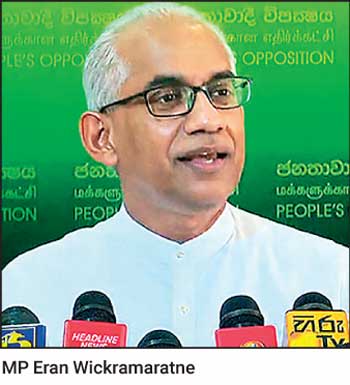Saturday Feb 21, 2026
Saturday Feb 21, 2026
Saturday, 22 October 2022 00:15 - - {{hitsCtrl.values.hits}}
 Samagi Jana Balawegaya (SJB) MP Eran Wickramaratne, speaking on the debate on the 22nd Constitutional Amendment in Parliament on Thursday, said that SJB as a party brought the 21st Amendment to the Constitution to Parliament with fundamental basis of the abolition of some of the powers of the executive Presidency as it is a liability to the Legislature.
Samagi Jana Balawegaya (SJB) MP Eran Wickramaratne, speaking on the debate on the 22nd Constitutional Amendment in Parliament on Thursday, said that SJB as a party brought the 21st Amendment to the Constitution to Parliament with fundamental basis of the abolition of some of the powers of the executive Presidency as it is a liability to the Legislature.
He said that the 22nd Amendment comes nowhere near the 19th Amendment which was actually removed by Rajapaksa Government. The 22A can be improved if the Government goes ahead with the Amendment that the Constitutional Council appointments be done with the agreement of the PM and the Leader of the Opposition.
On this assumption, there would be some improvement and positives that the procurement commission and the Audit Commission will also be included into the commissions. Public Officials then would be appointed more neutrally because of the involvement of the constitutional council.
“The 21st Amendment SJB presented proposed to abolish the draconian powers of the executive after having looked at the 44 years of Presidential system in this country. Though there are negatives and positives, overall, we have the conclusion that the executive Presidency is a liability as it hasn’t been sufficiently accountable to the Legislature and there has been abuse of power. Somebody said it has to be placed before the people for a referendum, so what’s the problem? Let the people also approve it,” he asked.
“Certain people argue that terrorism cannot be combatted without having an Executive Presidency. I do not know who put forward such a weak argument for the sake of the Executive Presidency. During the 1971 insurgency, there was no Executive Presidency in the country. Mrs Sirimavo Bandaranaike crushed the insurgency as the Prime Minister, making use of her Executive powers as the Prime Minister.”
He also said that the recent experience showed that the Governor of the Central Bank has been a political appointment, unheard of a minister resigns and is appointed as the Governor of the Central Bank. “I do not know where is in the world such things happen. But this is what happened in Sri Lanka. Now even the appointment of the Governor of Central Bank is to be brought under the constitutional council.
“Unfortunately, in the 19th Amendment the President acted when making appointments to ministries on the advice of the PM but now it has been reduced to mere consulting the PM. So, this amendment does not come anywhere near the 19th Amendment. However, if the amendments are properly moved in there are some positive aspects in it.”
Now the Government has brought in the 22nd Amendment and he said that SJB proposes that clause 44 (3) of it be amended by deleting the last paragraph of the clause. It reads:
“Provided however, preceding provisions of this paragraph shall not preclude the President from assigning any subject or function to himself on the advice of the Prime Minister and accordingly, any reference in the Constitution or any written law to the Minister to whom such subject or function is assigned, shall be read and construed as a reference to the President.”
“The President has the powers as determined by the Judiciary. He holds the Ministry of Defence. But we say that we don’t want to specifically mention that the President is not precluded from assigning any subject that he wants.”
The 22nd Amendment goes without saying what the Presidential powers are. The deletion of this provision in any way does not alter the powers of the President. Eran Wickramaratne urged that this argument should be viewed in the context of law and political theory.
Under the Westminster system, the Prime Minister can hold any office but it was unheard of for the British PM to have the Defence or the Finance Ministry or some other ministry. The head of the Cabinet of Ministers is a Chief Executive Officer who has the right to appoint ministers, to change ministers to change subjects and assign subjects.
But on the contrary, the Chief Executive Officer of the Sri Lankan Cabinet is the President of the country. Therefore, the President of the country does not have to assign to himself any subject but should assign to others. It is like being the monitor in the class. Monitor makes sure the responsibilities assigned to different people are carried out and evaluates their performances.
Therefore, Wickramaratne suggested to the Government that the last para of clause 44 (3) of the Amendment be deleted.